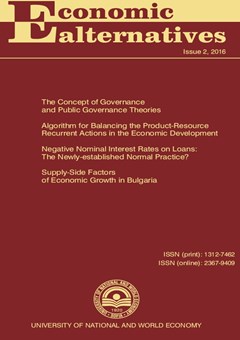Supply-Side Factors of Economic Growth in Bulgaria
Author: Ivan Todorov
Abstract
The present article discusses five equilibrium approaches to estimating elasticities in Bulgaria’s aggregate production function. The study has two objectives: first, to identify the best equilibrium approach to determining elasticity in Bulgaria’s aggregate production function; and second, to measure quantitatively the contributions of capital, labor and total factor productivity to Bulgaria’s economic growth under a currency board arrangement (CBA). An econometric procedure - ordinary least squares (OLS) estimation of Bulgaria’s aggregate production function with annual and quarterly data - has been used to select the best equilibrium approach to determining elasticities in this function. The OLS estimation has demonstrated that the first equilibrium approach, which is based on the final expenditure structure of Bulgaria’s gross domestic product (GDP), provides the most reliable results of all five equilibrium approaches. The second objective of the research has been accomplished by applying the growth accounting (GA) technique to Bulgaria for the period 1997-2013. The GA results imply total factor productivity and capital stock have been the main supply-side determinants of Bulgaria’s economic growth under a CBA, while employment has had an insignificant negative impact on growth.

